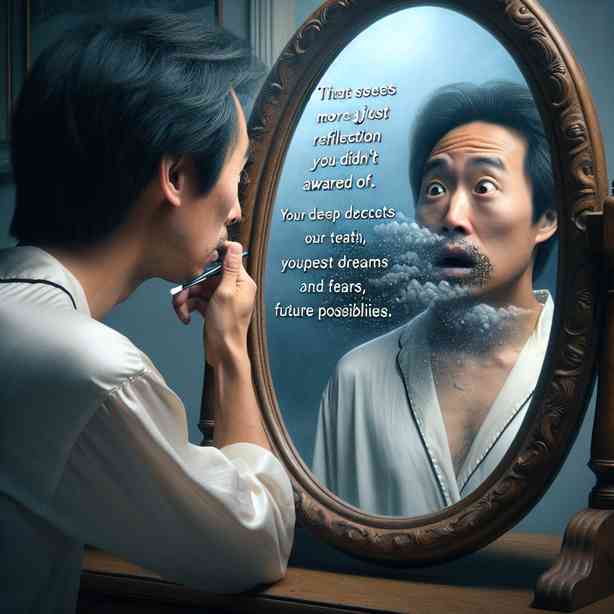
Mirrors have long been celebrated not just for their functional role in reflecting our image but also for their deeper philosophical and psychological implications. When we stand in front of a mirror, we often see more than just our outer appearance; we confront our inner selves, our thoughts, and even our emotions. This reflection can reveal more than merely the physical traits or habits we exhibit outwardly, especially concerning personal hygiene practices such as dental care. Often, a mirror can serve as a powerful tool for self-discovery and personal development, leading us to an exploration of habits, self-image, and overall well-being.
Dental hygiene is a topic that lies at the intersection of physical health and self-perception. Brushing and flossing are essential practices, but the mirror becomes a crucial ally in ensuring we uphold these standards. It allows us to inspect our oral health meticulously. As we gaze into our reflection while brushing our teeth, we can observe plaque build-up and the condition of our gums, quickly recognizing where we may need to pay additional attention. This visual feedback is critical; it reinforces good habits and motivates us to maintain a consistent dental hygiene routine.
Yet, there is more to the mirror than just these physical observations. Psychologically, when we look into a mirror, we might encounter various emotions ranging from self-acceptance to self-criticism. How we perceive ourselves in the mirror can dramatically influence our self-esteem and confidence. If we see a bright, healthy smile, it’s easy to feel positive and confident. Conversely, if we notice stains or plaque, it may lead to feelings of inadequacy or shame. This relationship emphasizes the importance of developing a robust self-image that is not solely based on our appearance but is also anchored in our overall health and hygiene practices.
Furthermore, the act of self-reflection in the mirror can extend beyond dental health. During these moments of solitude, individuals often turn inward, reflecting not just on their physical attributes but also on their emotional and mental states. This mindfulness practice can lead to greater self-awareness and insight into one’s feelings and motivations. By understanding how we perceive ourselves, we can identify areas of improvement not only in hygiene but also in mental health and overall well-being. It opens a dialogue with oneself, enabling individuals to examine underlying issues that may need addressing, from stress management to lifestyle changes.
Moreover, the cultural implications of beauty standards also surface when one looks into a mirror. The images and representations of beauty created by society can affect how individuals feel about their appearance. With constantly changing trends and ideals perpetuated by social media, it’s easy to fall into the trap of comparison when gazing into a mirror. This comparison can lead to detrimental thoughts and feelings of unworthiness. It’s essential to approach this phenomenon with a critical mindset, recognizing that everyone has unique attributes that contribute to their individuality. Embracing one’s natural beauty, with all its imperfections, can foster a healthier relationship with the self.
While the mirror offers reflections of our physical appearance, it is also a gateway to understanding our deeper psychological landscape. It encourages us to engage in conversations with ourselves about self-care, acceptance, and improvement. Being aware of how we respond to our reflection can highlight areas where we may need to grow, whether in terms of health practices or emotional well-being. The mirror, thus, serves a dual purpose: it assists us in maintaining our physical health, particularly in dental hygiene, while also providing a rare opportunity for introspection.
To maximize the transformational potential of mirrors, one can adopt certain practices. For instance, creating a small routine that incorporates positive affirmations while grooming can reinforce an affirming self-image. By standing before the mirror and expressing gratitude for our bodies and all they do for us, we cultivate self-love, which is essential for holistic health. This can lead to more mindful practices in both hygiene and personal care, ensuring we not only look after our teeth but also nurture our mental health.
In conclusion, when mirrors reveal more than just plaque, they become instrumental in shaping our self-perception and overall health practices. The interaction with one’s reflection allows for an exploration of both physical and emotional landscapes, prompting individuals to reflect deeply on their habits and self-acceptance. By fostering a positive relationship with our reflections, we can promote better dental hygiene while also enhancing our mental and emotional well-being. Thus, the mirror becomes a powerful ally in our journey toward self-improvement and holistic health, encouraging both personal accountability and self-acceptance. The next time you stand before a mirror, remember that it holds the power not just to reflect your outward appearance, but to inspire a deeper understanding of who you are and who you aspire to be.


